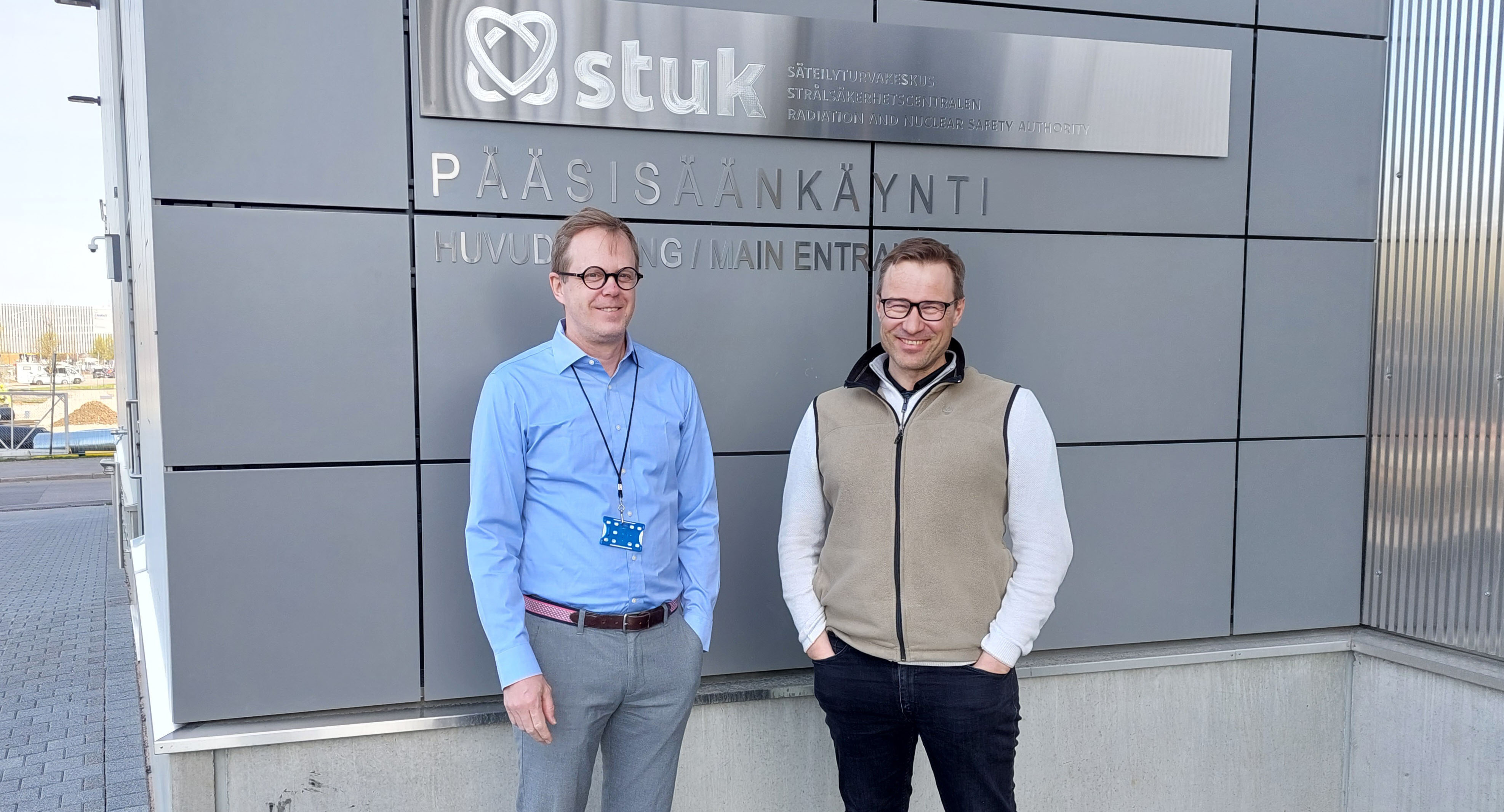Professors of Practice instill radiation safety expertise and research in universities
Professors of Practice Kari Peräjärvi and Teemu Siiskonen of the Radiation and Nuclear Safety Authority (STUK) strengthen radiation education and research and hope to inspire students on their career paths in the field. A person who has significant professional skills and merits outside the university world can be appointed as a Professor of Practice.

PhD, Docent Kari Peräjärvi started in May 2022 at the Department of Physics of the University of Jyväskylä as a Professor of Practice of radiation safety research. Kari works as a Principal Advisor at STUK, being responsible for the coordination of field measurement operations and the related remote support as well as nuclear and radiation physics research projects. He received his doctorate from the University of Jyväskylä in 2001. Prior to joining STUK in 2006, Kari worked as a researcher at the European Organization for Nuclear Research (CERN) and at the Lawrence Berkeley National Laboratory in California. In 2007, he became a docent at the University of Jyväskylä.
Teemu Siiskonen started to work as a Professor of Practice at the Department of Physics at the University of Helsinki in August 2022. The professorship is in the field of radiation dosimetry and interaction mechanisms. Teemu works at STUK as the Deputy Director of the Environmental Radiation Surveillance Department. He has been working for STUK for approximately twenty years. Teemu holds a doctorate from the Department of Physics at the University of Jyväskylä. He has experience in positions at CERN, the University of Oxford and the Finnish Meteorological Institute as well as in positions of trust in international research networks.
Professor of Practice – what does it mean?
According to the universities, a person with significant professional skills and merits from outside the university world and whose competence can be considered to be particularly useful for the university's teaching and research activities and wider societal interaction can be appointed a Professor of Practice. The position of a Professor of Practice is filled by invitation. In some universities, a doctoral degree is required. Professorship of Practice is always temporary and part-time, alongside the person's actual duties. Kari and Teemu’s part-time (20%) professorships last for five years.
In Jyväskylä, Kari will increase research related to radiation safety and the visibility of the physics department's research. He directs theses from bachelor's studies to doctoral dissertations and lectures on special courses in his field. He also develops the educational offer of the department in the direction of both public sector operators and companies. The long-term goal of the of the Professor of Practice is to create a radiation safety centre of excellence in Jyväskylä.
“The Radiation and Nuclear Safety Authority and the University of Jyväskylä have been cooperating for a long time, and now the co-operation is becoming even more extensive. The aim is to incorporate radiation safety research more permanently in the university operations, so that a centre of excellence in the field could be built and more experts would graduate from it,” says Kari. He wishes that he could set an example for the students to get excited about the field of radiation. “You can create a genuinely interesting and versatile career in nuclear physics and radiation safety.”
Teemu studies the determination of doses of ionizing radiation, i.e. dosimetry, and coordinates research in the field both in Finland and internationally. He also directs theses and dissertations. The purpose of the professorship is to support and develop domestic networks in the field of radiation safety and to guarantee the availability of experts also in the future as well as to increase the societal impact of research.
“Professorships of Practice serve as a link between the academic world and the end users of research data. By strengthening this link, we can better support our supervision and preparedness work with new innovations and experts and offer universities new opportunities for networking and increasing societal impact. With the guidance and lecturing of students, the field of radiation safety will become familiar to a wider group of students and we can ensure that there will be in-depth experts in the field also in the future,” says Teemu.
Read more (articles in Finnish only)
University of Jyväskylä press release 20 June 2022: Matemaattis-luonnontieteellisen tiedekunnan uudet työelämäprofessorit vahvistavat säteilyturvallisuuteen ja data-analyysiin liittyvää yhteistyötä (New Professors of Practice at the Faculty of Science strengthen co-operation in radiation safety and data analysis)
University of Helsinki press release 28 December 2022: Ympäristön säteilyvalvonta -osaston apulaisjohtaja tutkii ja opettaa säteilyannosten määrittämistä (The Deputy Director of the Environmental Radiation Surveillance Department studies and teaches the determination of radiation doses)
